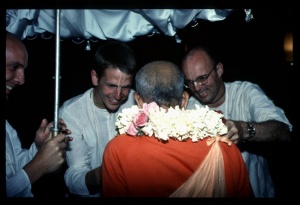SB 6.14.18: Difference between revisions
m (1 revision(s)) |
(Vanibot #0054 edit - transform synonyms into clickable links, which search similar occurrences) |
||
| (One intermediate revision by one other user not shown) | |||
| Line 1: | Line 1: | ||
{{info | {{info | ||
|speaker= | |speaker=Aṅgirā Muni | ||
|listener=King Citraketu | |listener=King Citraketu | ||
}} | }} | ||
[[Category:Srimad-Bhagavatam - Canto 06 Chapter 14]] | |||
[[Category:Bhagavatam Verses Spoken by Angira Muni - Vanisource|061418]] | |||
<div style="float:left">'''[[Srimad-Bhagavatam]] - [[SB 6|Sixth Canto]] - [[SB 6.14: King Citraketu's Lamentation|Chapter 14: King Citraketu's Lamentation]]'''</div> | |||
<div style="float:right">[[File:Go-previous.png|link=SB 6.14.17]] '''[[SB 6.14.17]] - [[SB 6.14.19]]''' [[File:Go-next.png|link=SB 6.14.19]]</div> | |||
{{RandomImage}} | |||
==== TEXT 18 ==== | ==== TEXT 18 ==== | ||
<div class="verse"> | |||
<div | :ātmānaṁ prakṛtiṣv addhā | ||
ātmānaṁ prakṛtiṣv addhā | :nidhāya śreya āpnuyāt | ||
nidhāya śreya āpnuyāt | :rājñā tathā prakṛtayo | ||
rājñā tathā prakṛtayo | :naradevāhitādhayaḥ | ||
naradevāhitādhayaḥ | |||
</div> | </div> | ||
| Line 17: | Line 22: | ||
==== SYNONYMS ==== | ==== SYNONYMS ==== | ||
<div class="synonyms"> | |||
<div | ''[//vanipedia.org/wiki/Special:VaniSearch?s=ātmānam&tab=syno_o&ds=1 ātmānam]'' — himself; ''[//vanipedia.org/wiki/Special:VaniSearch?s=prakṛtiṣu&tab=syno_o&ds=1 prakṛtiṣu]'' — under these seven royal elements; ''[//vanipedia.org/wiki/Special:VaniSearch?s=addhā&tab=syno_o&ds=1 addhā]'' — directly; ''[//vanipedia.org/wiki/Special:VaniSearch?s=nidhāya&tab=syno_o&ds=1 nidhāya]'' — placing; ''[//vanipedia.org/wiki/Special:VaniSearch?s=śreyaḥ&tab=syno_o&ds=1 śreyaḥ]'' — ultimate happiness; ''[//vanipedia.org/wiki/Special:VaniSearch?s=āpnuyāt&tab=syno_o&ds=1 āpnuyāt]'' — may obtain; ''[//vanipedia.org/wiki/Special:VaniSearch?s=rājñā&tab=syno_o&ds=1 rājñā]'' — by the king; ''[//vanipedia.org/wiki/Special:VaniSearch?s=tathā&tab=syno_o&ds=1 tathā]'' — so also; ''[//vanipedia.org/wiki/Special:VaniSearch?s=prakṛtayaḥ&tab=syno_o&ds=1 prakṛtayaḥ]'' — the dependent royal elements; ''[//vanipedia.org/wiki/Special:VaniSearch?s=nara&tab=syno_o&ds=1 nara]-[//vanipedia.org/wiki/Special:VaniSearch?s=deva&tab=syno_o&ds=1 deva]'' — O King; ''[//vanipedia.org/wiki/Special:VaniSearch?s=āhita&tab=syno_o&ds=1 āhita]-[//vanipedia.org/wiki/Special:VaniSearch?s=adhayaḥ&tab=syno_o&ds=1 adhayaḥ]'' — offering wealth and other items. | ||
</div> | </div> | ||
| Line 25: | Line 29: | ||
==== TRANSLATION ==== | ==== TRANSLATION ==== | ||
<div class="translation"> | |||
<div | |||
O King, O lord of humanity, when a king directly depends upon his associates and follows their instructions, he is happy. Similarly, when his associates offer their gifts and activities to the king and follow his orders, they are also happy. | O King, O lord of humanity, when a king directly depends upon his associates and follows their instructions, he is happy. Similarly, when his associates offer their gifts and activities to the king and follow his orders, they are also happy. | ||
</div> | </div> | ||
| Line 33: | Line 36: | ||
==== PURPORT ==== | ==== PURPORT ==== | ||
<div class="purport"> | |||
<div | |||
The actual happiness of a king and his dependents is described in this verse. A king should not simply give orders to his dependents because he is supreme; sometimes he must follow their instructions. Similarly, the dependents should depend on the king. This mutual dependence will make everyone happy. | The actual happiness of a king and his dependents is described in this verse. A king should not simply give orders to his dependents because he is supreme; sometimes he must follow their instructions. Similarly, the dependents should depend on the king. This mutual dependence will make everyone happy. | ||
</div> | </div> | ||
__NOTOC__ | |||
<div style="float:right; clear:both;">[[File:Go-previous.png|link=SB 6.14.17]] '''[[SB 6.14.17]] - [[SB 6.14.19]]''' [[File:Go-next.png|link=SB 6.14.19]]</div> | |||
__NOTOC__ | |||
__NOEDITSECTION__ | |||
Latest revision as of 22:28, 18 February 2024

A.C. Bhaktivedanta Swami Prabhupada
TEXT 18
- ātmānaṁ prakṛtiṣv addhā
- nidhāya śreya āpnuyāt
- rājñā tathā prakṛtayo
- naradevāhitādhayaḥ
SYNONYMS
ātmānam — himself; prakṛtiṣu — under these seven royal elements; addhā — directly; nidhāya — placing; śreyaḥ — ultimate happiness; āpnuyāt — may obtain; rājñā — by the king; tathā — so also; prakṛtayaḥ — the dependent royal elements; nara-deva — O King; āhita-adhayaḥ — offering wealth and other items.
TRANSLATION
O King, O lord of humanity, when a king directly depends upon his associates and follows their instructions, he is happy. Similarly, when his associates offer their gifts and activities to the king and follow his orders, they are also happy.
PURPORT
The actual happiness of a king and his dependents is described in this verse. A king should not simply give orders to his dependents because he is supreme; sometimes he must follow their instructions. Similarly, the dependents should depend on the king. This mutual dependence will make everyone happy.